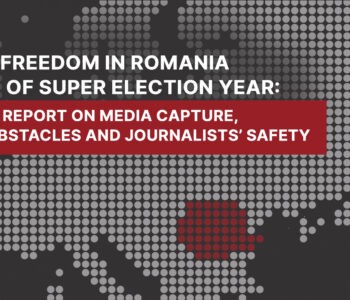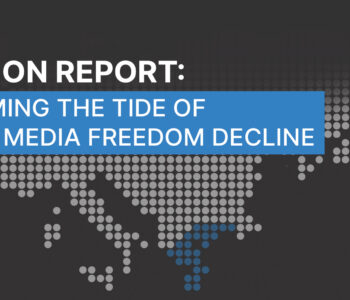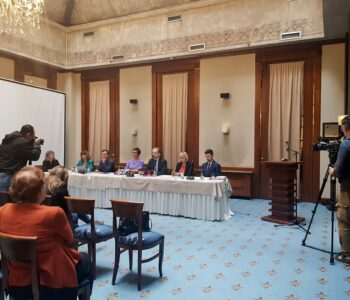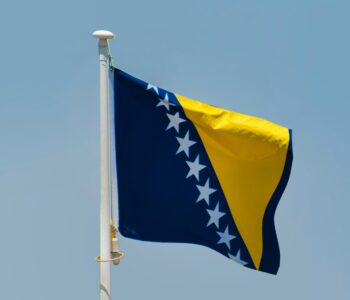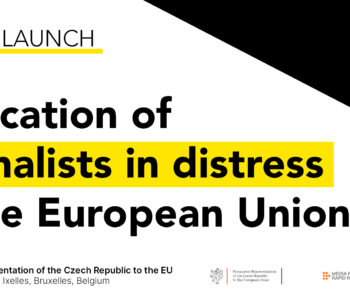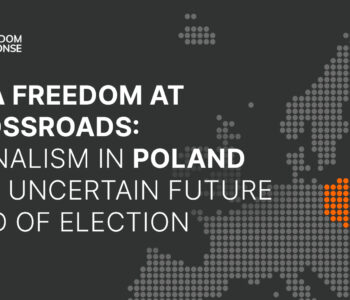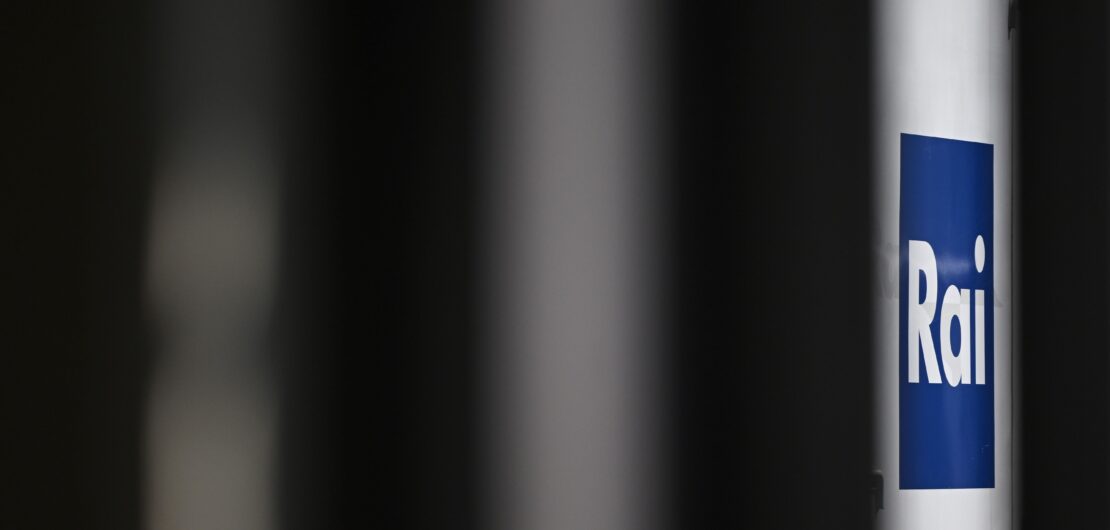 Library
Library
Italy: Media freedom coalition sounds the alarm on political…
Media Freedom coalition sounds the alarm on political meddling and legal threats to journalism
Amid the forthcoming EU elections, the Media Freedom Rapid Response (MFRR) was prompted to organise an urgent advocacy mission to Italy on May 16-17 to address some recent developments related to press and media freedom. Such concerns included unprecedented political interference in the public service media, legal harassment of dissenting journalists by government members, and the potential acquisition of AGI news agency by MP Antonio Angelucci.
Available in Italian here.
Italy’s current state of media freedom raises significant concerns. The worrying trend of political interference and legal harassment undermines democratic principles and threatens the independence and pluralism essential for a free press.
During its visit to Rome, the MFRR delegation met with officials of several institutional bodies, such as:
- Senator Barbara Floridia, President of the Parliamentary Committee for the general direction and supervision of radio and TV broadcasting in the Chamber of Deputies;
- Senator Ilaria Cucchi, Deputy Chairwoman of the Justice Committee of the Senate of the Republic;
- Giacomo Lasorella, President of the Italian Communications Regulatory Authority (AGCOM) alongside AGCOM board members;
- MP Valentina Grippo, member of the Italian delegation to the Parliamentary Assembly of the Council of Europe;
- Dr Pierluigi Mazzella, Italian Government representative at the Steering Committee on Media and Information Society (CDMSI) of the Council of Europe;
- Members of the Permanent Representation in Italy of the European Commission.
The MFRR delegation also met with several journalists from various media outlets, trade unions, and representatives of civil society organisations to analyse the state of play of media freedom in the country, joining the Unione Sindacale Giornalisti Rai (USiGRai) sit-in dedicated to press freedom in front of RAI headquarters.
Most regretfully, the mission did not have the opportunity to meet anyone from the ruling coalition, as all the requests for a meeting were either declined or ignored.
Political interference in public media
Radiotelevisione Italiana (RAI), the Italian public service broadcaster, is currently subjected to an unprecedented degree of political interference that risks leading to a potential full state control. Although a certain politicisation of RAI is not a new phenomenon, discussions with journalists from RAI confirmed the unprecedented level of pressure and self-censorship.
The delegation welcomed Senator Barbara Floridia’s initiative promoting a national convention (“Stati Generali”) composed of all political parties, independent media experts, and other stakeholders, directed at reforming public media’s governance and funding in line with the European Media Freedom Act.
Failure to decriminalise defamation and reform defamation civil code provisions
Journalists, particularly investigative ones exposing wrongdoings by politicians and publishing information of public interest, face an increasing number of vexatious lawsuits often led by members of the current government, including the Prime Minister, Giorgia Meloni
Instead of joining the European trend towards decriminalising defamation and bringing it under civil law, and starting to transpose the EU’s anti-SLAPP Directive, the Italian government chooses to go in the opposite direction. The Balboni Bill, which was proposed by the ruling coalition to reform defamation, not only fails to decriminalise defamation and to consider a comprehensive reform under the remit of the civil law. If approved, the provisions of the Balboni Bill risk compressing the space of editorial independence even further and exerting a heavier chilling effect on the journalistic community.
Potential acquisition of AGI news agency
The potential acquisition of one of the country’s leading news agencies, AGI (Agenzia Giornalistica Italiana), by MP Antonio Angelucci – who already controls several major newspapers – poses a significant risk to AGI’s editorial independence.
If it comes to fruition, the buyout would be in contrast with Article 6 of the European Media Freedom Act, stating that editorial managers must be free to make decisions without interference and that anyone with significant interests in media service providers must declare any conflicts of interest. Moreover, it could set a dangerous precedent that could put other news agencies in the country at risk.
Recommendations
- We call on the Italian parliament together with independent experts, the journalists representative organisations, such as the Federazione Nazionale Stampa Italiana (FNSI) and the Italian Chamber of Journalists (Ordine dei Giornalisti), in consultation with the European Broadcasting Union (EBU) to initiate a comprehensive reform of the legislation regulating Italian public broadcasters in line with Article 5 of the European Media Freedom Act;
- We urge the Italian Parliament to implement a comprehensive reform of defamation laws, aligning them with EU and international freedom of expression standards;
- If any acquisition bid for the news agency AGI concretises, regulators AGCOM and AGCM (Autorità Garante della Concorrenza e del Mercato) should conduct a thorough and transparent evaluation and consider the impact on media pluralism, editorial independence, and conflict of interest, in accordance with the European Media Freedom Act.
MFRR Next steps
In the coming weeks, the MFRR will continue to closely monitor developments in the country in collaboration with local partners, and will reiterate the request for online meetings with representatives of the Italian ruling coalition. The final report outlining the key findings with a list of recommendations geared at the Italian government, but also the European Commission will be released in the coming months. The consortium experts are ready to offer their expertise to promote the independence of public media and press freedom in Italy.
La coalizione per la libertà dei media lancia l’allarme su interferenze politiche e minacce legali che colpiscono il giornalismo italiano
In vista delle prossime elezioni europee, il Media Freedom Rapid Response (MFRR) è stato spinto a organizzare una missione di advocacy urgente in Italia il 16-17 maggio per affrontare alcuni sviluppi preoccupanti relativi alla libertà di stampa e dei media. Tra le questioni affrontate dal consorzio europeo figurano interferenze politiche senza precedenti nei media del servizio pubblico, minacce legali da parte di membri del governo nei confronti di giornalisti critici del potere, e la possibile acquisizione dell’agenzia di stampa AGI da parte del deputato Antonio Angelucci.
L’attuale stato della libertà dei media in Italia solleva numerosi timori. La preoccupante tendenza alle ingerenze politiche e alle molestie legali mina i principi democratici e minaccia l’indipendenza e il pluralismo essenziali per una stampa libera.
Durante la visita a Roma, la delegazione MFRR ha incontrato funzionari di diversi organi istituzionali, tra cui:
- La senatrice Barbara Floridia, Presidente della Commissione parlamentare per l’indirizzo generale e la vigilanza dei servizi radiotelevisivi;
- La senatrice Ilaria Cucchi, Vicepresidente della Commissione Giustizia del Senato della Repubblica;
- Giacomo Lasorella, Presidente dell’Autorità per le Garanzie nelle Comunicazioni (AGCOM) insieme ai membri del consiglio AGCOM;
- La Deputata Valentina Grippo, membro della delegazione italiana all’Assemblea parlamentare del Consiglio d’Europa;
- Il dottor Pierluigi Mazzella, Rappresentante del governo italiano presso il Comitato Direttivo sui Media e la Società dell’Informazione (CDMSI) del Consiglio d’Europa;
- Membri della Rappresentanza Permanente in Italia della Commissione Europea.
La delegazione MFRR ha incontrato diversi giornalisti di varie testate, sindacati e rappresentanti di organizzazioni della società civile per analizzare la situazione della libertà dei media nel paese, prendendo parte al sit-in dedicato alla libertà di stampa davanti alla sede della RAI ed organizzato dall’Unione Sindacale Giornalisti Rai (USiGRai).
Con grande rammarico, la missione non ha avuto l’opportunità di incontrare nessun esponente della coalizione di governo, poiché tutte le richieste di incontro sono state rifiutate o ignorate.
Ingerenze politiche nei media pubblici
La Radiotelevisione Italiana (RAI), il servizio pubblico radiotelevisivo italiano, è attualmente soggetta a un grado di ingerenza politica senza precedenti che rischia di portare ad un completo controllo da parte del governo in carica. Sebbene una certa politicizzazione del servizio pubblico non sia un fenomeno nuovo, le discussioni con alcuni giornalisti della RAI hanno confermato un livello di pressione e autocensura senza precedenti.
La delegazione ha accolto con favore l’iniziativa della senatrice Barbara Floridia di promuovere una convenzione nazionale (“Stati Generali”) composta da tutti i partiti politici, esperti mediatici indipendenti e altri stakeholder, volta a riformare la governance e il finanziamento dei media pubblici in linea con lo il Regolamento europeo sulla libertà dei media.
Mancata depenalizzazione della diffamazione e riforma delle disposizioni del codice civile sulla diffamazione
I giornalisti, in particolare quelli investigativi che denunciano illeciti da parte di politici e pubblicano informazioni di interesse pubblico, devono fronteggiare un numero crescente di azioni temerarie spesso avviate da membri dell’attuale governo, compresa la Presidente del Consiglio, Giorgia Meloni.
Invece di aderire alla tendenza europea diretta alla depenalizzazione della diffamazione, di procedere con una riforma del codice civile, e di iniziare a recepire la direttiva anti-SLAPP dell’UE, il governo italiano sceglie di andare nella direzione opposta. Il DDL Balboni, proposto dalla coalizione di governo per riformare la diffamazione, non solo non depenalizza la diffamazione e non avvia una riforma completa nell’ambito del diritto civile: se approvato, le disposizioni del DDL Balboni rischiano di comprimere ulteriormente lo spazio dell’indipendenza editoriale e di esercitare un grave effetto inibitorio sulla comunità giornalistica.
Possibile acquisizione dell’agenzia di stampa AGI
La possibile acquisizione di AGI (Agenzia Giornalistica Italiana), da parte del deputato Antonio Angelucci – già proprietario di diversi importanti quotidiani – pone un serio rischio per l’indipendenza editoriale di una delle principali agenzie di stampa del paese.
Se si concretizzasse, l’acquisizione sarebbe in contrasto con l’articolo 6 del Regolamento europeo sulla libertà dei media, il quale stabilisce che i responsabili editoriali devono essere liberi di prendere decisioni senza interferenze e che chiunque abbia interessi in fornitori di servizi di media deve dichiarare eventuali conflitti di interesse. Tale acquisizione potrebbe inoltre creare un pericoloso precedente che rischierebbe di impattare altre agenzie di stampa nel paese e rappresenterebbe un ulteriore peggioramento dell’annoso problema della concentrazione dei media in Italia.
Raccomandazioni
- Invitiamo il Parlamento italiano, affiancato da esperti indipendenti, dalle associazioni di categoria, tra cui la Federazione Nazionale della Stampa Italiana (FNSI) e l’Ordine dei Giornalisti (OdG), in collaborazione con con l’Unione Europea di Radiodiffusione (EBU) ad avviare una riforma completa della legislazione che regola i servizi radiotelevisivi pubblici italiani in linea con l’articolo 5 del Regolamento europeo sulla libertà dei media;
- Esortiamo il Parlamento italiano a implementare una riforma completa delle leggi sulla diffamazione, in linea con gli standard UE e internazionali sulla libertà di espressione;
- Se si concretizzasse una proposta di acquisizione dell’agenzia di stampa AGI, i regolatori AGCOM e AGCM (Autorità Garante della Concorrenza e del Mercato) dovrebbero condurre una valutazione approfondita e trasparente diretta a considerare l’impatto sul pluralismo dei media, l’indipendenza editoriale e il conflitto di interessi, in conformità con il Regolamento europeo sulla libertà dei media.
Prossimi passi della rete MFRR
Nelle prossime settimane, il consorzio MFRR, in collaborazione con i partner locali, continuerà a monitorare gli sviluppi nel paese e rinnoverà la richiesta di incontro online con i rappresentanti della coalizione di governo italiana. I risultati della missione saranno presentati nei prossimi mesi in un rapporto accompagnato da una serie di raccomandazioni rivolte al governo italiano e alla Commissione Europea. Gli esperti del consorzio sono inoltre pronti a mettere a disposizione la propria competenza per promuovere l’indipendenza dei media pubblici e la libertà di stampa in Italia.
La delegazione MFRR era composta da rappresentanti di ARTICLE 19 Europe, dell’European Centre for Press and Media Freedom (ECPMF), della European Federation of Journalists (EFJ), dell’International Press Institute (IPI) e di OBC Transeuropa (OBCT).
This statement was coordinated by the Media Freedom Rapid Response (MFRR), a Europe-wide mechanism which tracks, monitors and responds to violations of press and media freedom in EU Member States and Candidate Countries.


